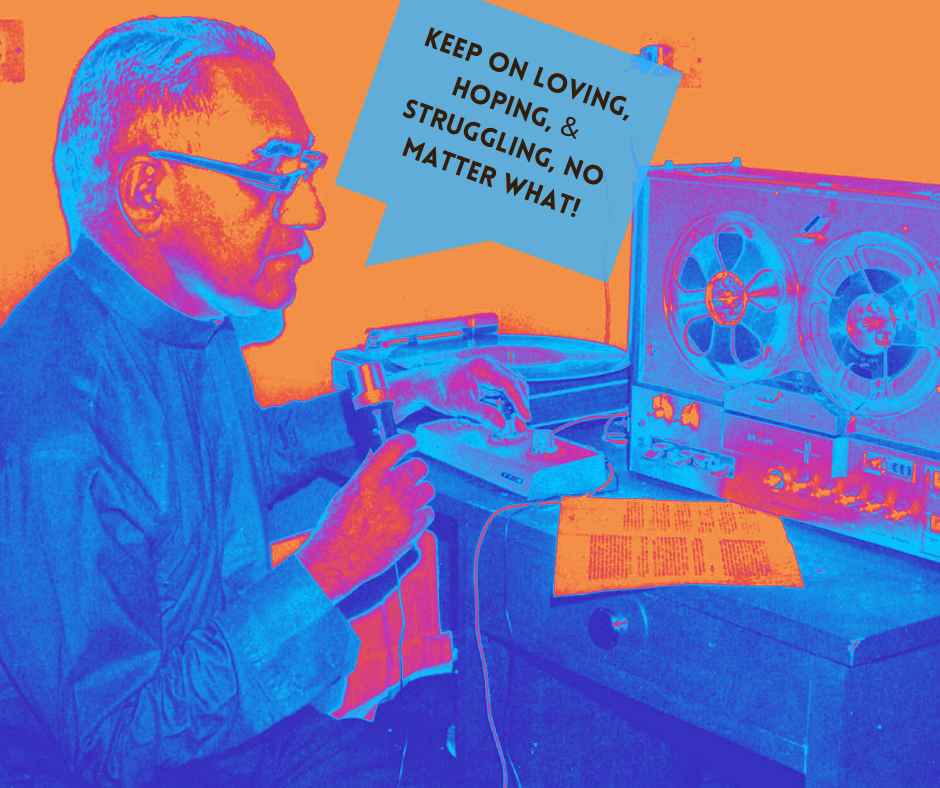ADVENT WITH SAINT OSCAR ROMERO pt.2
My sister, Mary, introduced me to hopepunk this week. "Hopepunk" is a hopeful literary response to "grimdark," a type of fiction with a tone, style, or setting that is particularly dystopian, amoral, and violent.
More than a storytelling movement, however, hopepunk is a way of being; it's a commitment to "keep fighting, no matter what." If that seems airy fairy, consider the concept of hope. What does it entail? Love, kindness, faith in humanity, and, for us Christians, faith in God.
Now, picture these ideas not as a brightly optimistic state of being but as an active political choice, made with total self-awareness that things might be bleak or even frankly hopeless, and amid that bleakness, you'll keep hoping, loving, [and] being kind nonetheless. By actively choosing love and kindness and not settling for the way things are, choosing hope becomes an act that affirms our humanity and an act of resistance against cynical worldviews that dismiss hope as a powerful force for change. (Hopepunk, explained: the storytelling trend that weaponizes optimism - Vox)
The founder of hopepunk says, "Hopepunk says that genuinely and sincerely caring about something, anything, requires bravery and strength. Hopepunk isn't about submission or acceptance: It's about standing up and fighting for your beliefs. It's about standing up for other people. It's about DEMANDING a better, kinder world, and truly believing that we can get there if we care about each other as hard as possible, with every drop of power in our little hearts."
I think Archbishop Oscar Romero, our Advent guide, embodied hopepunk. Oscar Romero was a hopepunker, but a special kind; his hopepunk was rooted in Jesus.
"At the centre of Romero's preaching was this central belief: the gospel is not an old-fashioned fairytale, but is alive and breathing, right here in our present time and circumstances. It was not hard for him to see Christ crucified all around him in the suffering of his people, who bore the image of God. And his conviction that Christ comes to us at every moment in human history made it possible for him to see the hope of the resurrection all around him, even in spite of the terrible circumstances that filled his days." (Camron Bellm, Advent with Saint Oscar Romero)
Romero could do what he did because of his firm belief in Jesus' arrival, God's arrival, on earth. Today's readings speak about Christ's coming, and they also talk about preparation, preparing for Christ's arrival, to receive God.
The prophet Isaiah says: A voice of one calling: "In the wilderness, prepare the way for the Lord; make straight in the desert a highway for our God. The writer of Mark says that John the Baptist, Jesus' cousin, embodied Isaiah's words, preparing the way for Jesus, announcing his arrival, and preparing the people to receive him.
Advent is a season where we look forward to the coming of Christ, but it's also a time when we can/should intentionally prepare ourselves, our homes, and our churches to welcome Jesus (again) at Christmas. In his 2nd Advent sermon, Romero speaks about preparing to receive Christ, our posture, and attitude; do we look forward to the arrival of Christ with a sense of expectation, hope, and joy, with a sense of excitement, excitement that the saving presence of God might emerge in new ways for us (individually and collectively), or are we filled with ambivalence and cynicism?
Romero says, "Who, at some time, has not had this experience of Advent, this experience of preparing to receive a friend, a son or daughter, a spouse or parent coming from a distant place? One prepares the home and gets ready to welcome the person with a warm and cordial celebration. This gives insight into what the Church wishes to achieve during this time, namely, a warm preparation [for Christ's arrival]."
That quote, for some reason, undid me. The invitation to prepare for the coming of Christ in the same way I would lovingly prepare food and my home to welcome a guest coming from a distant place moved me. It caused me to pause and to ask myself in what ways, amid the busy and crazy world, I was preparing myself to receive Jesus, not just in an individual private sense but in a way that my reception of Jesus might be a catalyst for inner and outer transformation (what I believe and what I do). What does preparing ourselves to receive Christ like we receive close friends or family look like? What does it look like to welcome Jesus amid considerable heartache? What does it look like for us to do that as individuals? Silence, prayer, or intentionally cultivating a posture of humility and hunger for God, stopping to notice the good things God gives amid the hard, picking up that dusty Bible and giving it another go? What does preparing our place of worship look like to receive Christ (particularly those on the margins)? Preparing to meet Jesus and then meeting him in the community, in the poor, and in bread and wine is part of Advent, and it provides the fuel we need to embody hope and joy, even when it doesn’t make sense.
Here's a question for mediation: "This year has been exceedingly difficult, on a national and global scale, but you have probably also had your own personal share of sorrows, whether they be losses or disappointments. In spite of all of this, we are reminded, Jesus comes. Imagine, just for a moment, that you are preparing a place in the midst of all this for Jesus to be welcomed. [Let yourself give in to joy, a joy that does not clear away the sorrow, but abides with it"] (Advent with St. Oscar Romero, Cameron Bellm).
—————
Thank you to Cameron Bellm for her Advent with Saint Oscar Romero devotional. Also, here is an article about hopepunk: Hopepunk, explained: the storytelling trend that weaponizes optimism - Vox.

